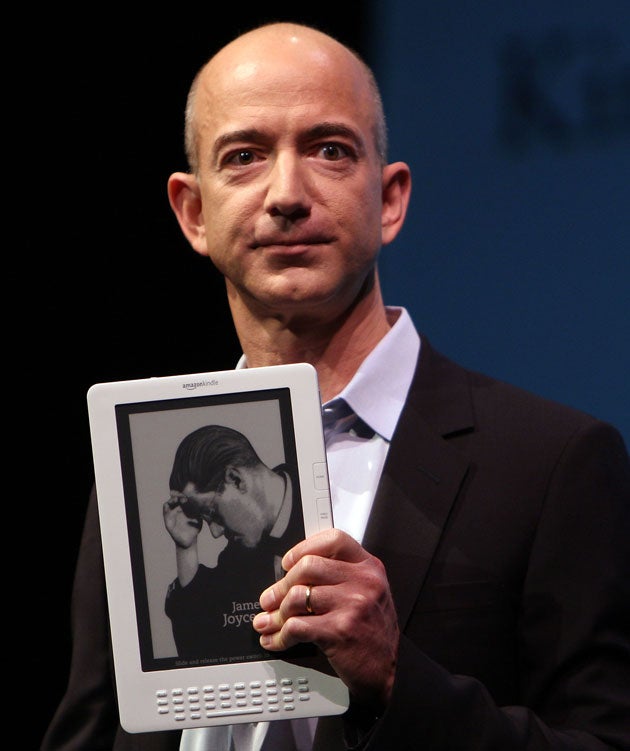Amazon.com Inc. will release a larger version of its Kindle electronic reading device that is geared toward newspapers, magazines and textbooks.
During a press event today at Pace University in New York, Amazon founder and Chief Executive Jeff Bezos showed off the device. It has a grayscale screen that is 2 1/2 times as large as the current Kindle, which has a 6-inch diagonal screen. It also includes a QWERTY keyboard like the current Kindle.
The announcement comes three months after Amazon revealed a slimmer, updated version of the original $359 Kindle, which wirelessly downloads books.
Newspaper and magazine lovers can also buy subscriptions to publications that are wirelessly delivered to the device, too.
But the current device's six-inch screen, is more suited to paperback books than larger reading material.
The rollout of the bigger device, better suited for digital textbooks and periodicals, could help students get educational materials more cheaply and give newspapers and magazines a better way to sell digital versions of their content.
So far the Kindle's digital delivery method has meant lower prices for its content. New releases of books are typically $10. Newsweek is $1.49 per month via Kindle, about half of what a subscription to the print edition sells for on Newsweek's website.
As any college student knows, textbooks are notoriously costly. A 2005 Government Accountability Office report put the average cost of textbooks at $900 per year for students at four-year public colleges. The textbook industry noted that the figure includes supplies, and estimated that books alone cost about $625 per year.
Textbook publishers say they must charge such prices because the books are expensive to produce and often have only one year of sales to recoup their investment. After the first year, students tend to buy used books, cutting out revenue for the publishers.
Bruce Hildebrand, executive director for higher education for the Association of American Publishers, which represents several big textbook companies, said the publishers are "absolutely agnostic" about how their content is delivered, so if costs like printing and shipping were removed, the companies could charge less.
As a result, he said, there is potential for students to save money by using an e-reader device like the Kindle, even with the upfront cost of the product.
The idea of altering textbook economics is already being tried by CourseSmart, a Belmont, California-based company started by several textbook publishers. It sells digital copies of about 6,200 textbooks - more than half of the core textbooks used in colleges, executive vice president Frank Lyman said.
Students can download a CourseSmart book to one computer or view it online. Lyman said the company is interested in supporting other delivery platforms, including e-book devices, but it doesn't have any formal agreements yet.
While a Kindle geared toward textbooks would represent a new form of competition, Lyman said it would also generate more interest in digital course materials - something his company could benefit from.
A larger Kindle could also intrigue newspaper and magazine publishers that have been staggered by the recession and the online migration of readers and advertisers - and are hard-pressed to get people to pay for content in web browsers.
Up to now selling digital copies to portable devices like the Kindle mainly has been an experiment. Ken Doctor, a media analyst at Outsell, said that a larger-screen Kindle would be another reason for publishers to hope for profitable electronic distribution. He added, however, that a lot will depend on how much of each page a reader can see on a device's screen, and how intuitive it is to navigate the content.
Another company, Mountain View, California-based Plastic Logic, is preparing to launch its own e-reader early next year with a 10.5-inch grayscale screen.
The company is not saying how much the unit will cost or whether users will be able to access content wirelessly like they can on the Kindle. But already Plastic Logic has content partnerships with several newspapers, including USA Today and The Financial Times.
Plastic Logic's vice president of business development, Daren Benzi, said publishers are excited about the general emergence of e-reader devices.
"If Amazon has shown us anything," he said, "it's there is a market for this."

Join our commenting forum
Join thought-provoking conversations, follow other Independent readers and see their replies
Comments